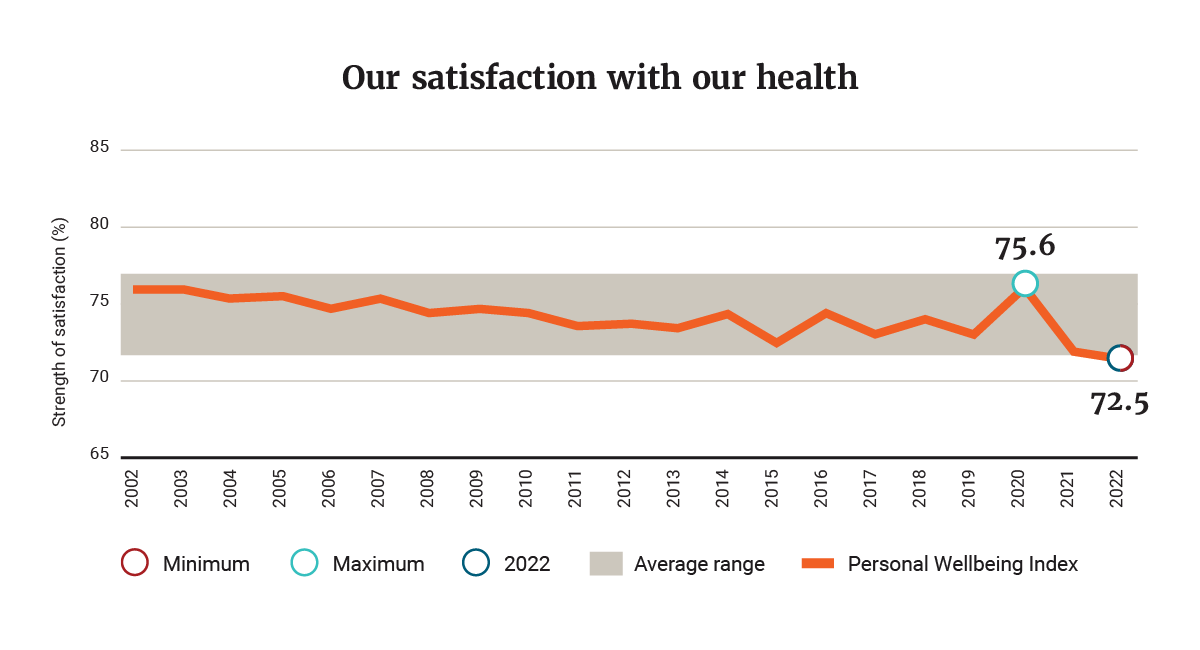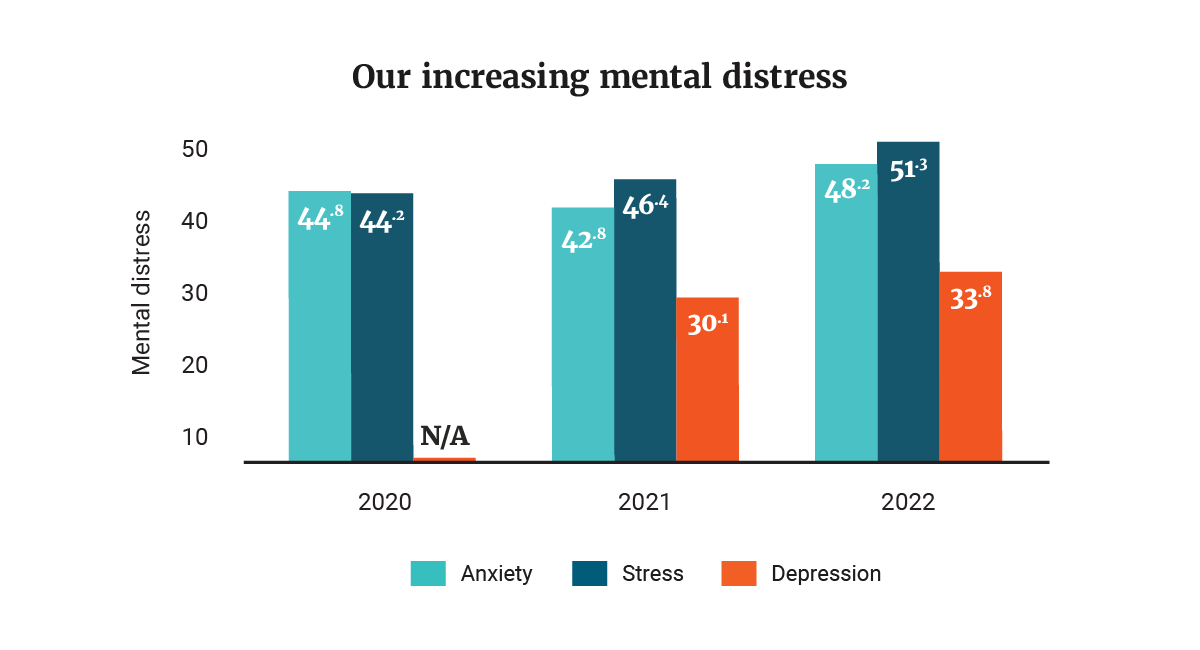“I think during the pandemic in 2020, Australians felt quite protected. We had some of the strictest lockdowns in the world and people felt like that was protecting our health.”—Dr Kate Lycett, School of Psychology, Deakin University
Key points
- The latest results from the Australian Unity Wellbeing Index show there’s been a decline in our satisfaction with our health, with the survey recording the lowest-ever levels of satisfaction.
- The results reflect our worsening physical health, as well as increased levels of mental distress.
- Broader external challenges, such as cost-of-living pressures, may also have an impact on our satisfaction with our health.
In March 2020, the Australian government declared a human biosecurity emergency as it scrambled to control the outbreak of COVID-19. Borders were slammed shut, returning residents were forced into quarantine hotels, and social-distancing rules were enforced ahead of some of the world’s toughest lockdowns. It was a health crisis that gripped our nation on a truly unprecedented scale.
And yet, despite all this, Australian Unity Wellbeing Index research conducted in 2020 by Deakin University showed that Australians’ satisfaction with their health was particularly high during those early months of the pandemic.
Two years on, when the worst of the pandemic is supposedly behind us, this health satisfaction rate fell to the lowest levels recorded in 21 years. So what’s caused this unexpected dip and why do Australians now have an increasingly gloomy outlook when it comes to their health?
.jpg?h=650&w=1200&hash=1A8771534293762CB700C762BB0DCE1D)
Post-lockdown challenges
Timing may play a role in the results. Lead researcher Dr Kate Lycett, from Deakin University's School of Psychology, points to the fact that the most recent Australian Unity Wellbeing Index survey took place in May and June 2022, when COVID-19 was raging and the country was also battling a flu epidemic. “At the time, there actually was a lot of illness in the community,” she concedes.
But what may have exacerbated this are medical workforce issues that became more glaring when we entered “COVID-normal".
“I think during the pandemic in 2020, Australians felt quite protected,” she says.
“We had some of the strictest lockdowns in the world and people felt like that was protecting our health. Since we've come out of the lockdowns, we know that it's been challenging to get into hospitals due to general staff shortages, and that people are even struggling to get into GPs.
"I think all of that probably adds to people feeling vulnerable about their satisfaction with their health.”

The unfortunate reality of worsening health
The plummeting satisfaction levels appear to reflect an unfortunate reality: Australians are less satisfied with their health because, in many cases, it has genuinely deteriorated.
Mental and physical health across the community have both declined in the later stages of the pandemic compared to pre-pandemic levels, which is reflected in current attitudes about personal wellbeing.
When it comes to our physical health, data from the Actuaries Institute revealed that in 2022, Australia experienced more than 20,000 excess deaths than would have been expected had the pandemic not occurred. Just over half of those deaths were directly attributable to COVID-19 infection, and in around 15 percent of cases, COVID-19 was a contributing factor.
Additional excess deaths were also recorded from conditions like cancer, cerebrovascular disease and diabetes. Some of these may have been the result of missed routine care during the pandemic, when people weren’t accessing diagnostic or treatment services as promptly—potentially leading to worse outcomes and higher mortality in these areas.

The mental health epidemic
The results of the Australian Unity Wellbeing Index also record a worrying spike in mental health issues, with feelings of depression, anxiety and stress all trending somewhat higher in 2022 compared to the start of the pandemic.The broader context
Right now, Australia faces a host of challenges on multiple fronts, with real concerns about the cost of living, climate change and geopolitical instability.
As Australians move into a period of sustained uncertainty following the pandemic, these compounded difficulties are likely influencing how people evaluate their health. Given the scale of disruption in recent years—followed by economic, social and environmental challenges—it’s unsurprising that satisfaction with health has taken a hit. While the pandemic played a major role, today’s circumstances continue to shape community wellbeing in meaningful ways.
Disclaimer: Information provided in this article is of a general nature. Australian Unity accepts no responsibility for the accuracy of any of the opinions, advice, representations or information contained in this publication. Readers should rely on their own advice and enquiries in making decisions affecting their own health, wellbeing or interest. Interviewee titles and employer are cited as at the time of interview and may have changed since publication.


